Rufus Sewell on Playing ‘The Good Guy’s Bad Guy’ in Netflix’s “The Diplomat”
A proper English thespian who originated a role in Tom Stoppard’s Laurence Olivier Award-winning play Arcadia fresh out of acting school, Rufus Sewell has since excelled as a character actor with leading man looks. Over the past few years he’s played a sadistic aristocrat (The Illusionist); a Nazi (The Man in the High Castle); an astrophysicist (Eleventh Hour); and a drunken artist (The Marvelous Mrs. Maisel), for which he earned an Emmy nomination. Now, Sewell’s co-starring in The Diplomat as Hal Wyler, the savvy American husband of Keri Russell’s title character.
Created by former The West Wing writer-producer Debora Cahn, the Netflix political thriller follows Kate Wyler, U.S. Ambassador to the UK. Hal protects her interests amid a treacherous thicket of suspect politicians, bombings, treason, and state secrets. In his character’s defense, Sewell tells The Credits, “I would describe Hal as the good guy’s bad guy in that he will be underhanded and cutthroat in his machinations to do something he truly believes is for the good of mankind. In that regard, he’s not a careerist.”
Speaking from the garage of his home in Los Angeles, Sewell extols the virtues of French movies, screwball comedies, and that unquantifiable thing called chemistry.
How did you make your brash American character so convincing?
It’s lovely to hear that I bring out “brash American” – something that is almost jarring because that is so not me. The trick [of being an actor] is to do enough work that nobody notices that you’re doing any acting when in fact you’re working your little socks off!
You start Season 2 flat on your back in the hospital after being blown up in a car bomb attack in the Season 1 finale, presumably traumatized but loath to show it?
Initially, he’s not traumatized at all. As Kate says, people have tried to kill Hal many times. He’s, you might say, bulletproof to the point of exasperation in that he seems to come out of these things relatively unscathed. So I think Hal’s assumption, based on experience, is that he’s absolutely fine—until suddenly he isn’t. When they’re attending the fireworks and he has that panic attack episode, it’s not as if he’s been trying to conceal it all that time. Unless I was doing such subtle acting that nobody noticed, not even me. [laughing]. The idea in the writing and my conception of it was that the fireworks took Hal — and Kate — completely by surprise.
You play the supportive spouse in The Diplomat even though you’ve established a formidable State Department career of your own. Surely Hal must be ambitious in his own right?
Well, he’s incredibly ambitious for her. too. When people see Hal wheeling and dealing behind the scenes, the assumption is he’s doing it for his advantage or her eventual disadvantage, but that is not the case. The whole set-up of the show is that Hal manipulated Kate into a position so that she can be where she belongs, right at the top. On set, this is something we often talked about with Keri and Deb, the writer and showrunner. If the door had nudged open for Hal, you can best believe he would take that door, but the door that is opening is for Kate to be vice president, so that’s the play — that’s where we point our guns.
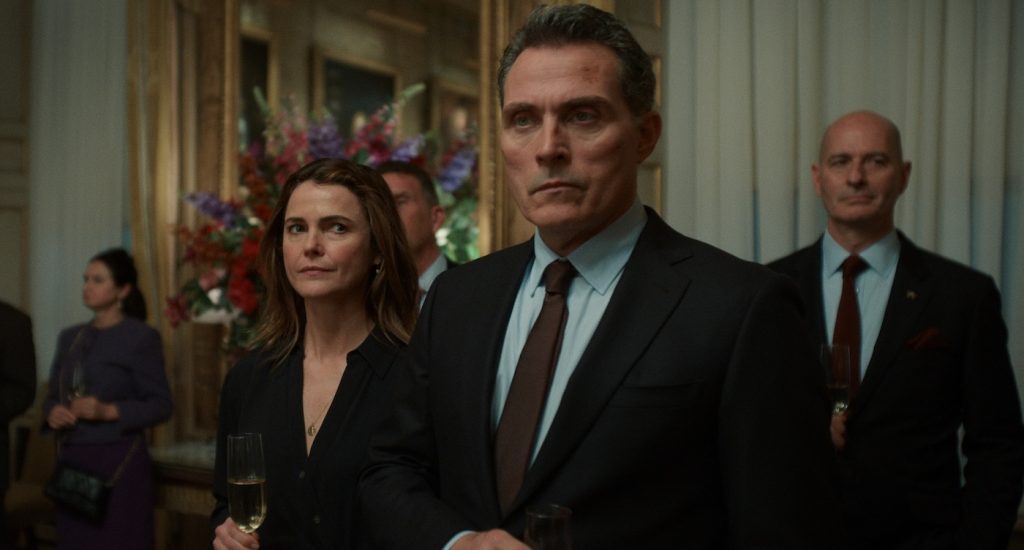
Did you have any references in mind that shaped the way you thought about Hal’s role in The Diplomat?
There’s a fantastic scene in Primary Colors, where there’s a question about whether it’s moral to take advantage of a rival’s [secret] past in order to win. John Travolta, as the Bill Clinton—inspired character, says, “Yes. If you don’t know when to kill, then you’re not in the right job.” So what I’m saying is, when you have an opportunity to win, for all of the right reasons, you have to take it. Hal is one of these people. And in that sense, Kate too is a killer.
It’s fascinating to witness the domestic dimension of the story, when Hal and Kate retire from public view and go to bed. The pajamas, the banter, the sex all seem to be part of the same flow?
That was there when I read the first couple of scripts, and I was immediately smitten. It reminded me of being a bit like a French movie: people would be arguing, the lady, or the gent, would go into the bathroom, take a pee, and carry on. It wasn’t a thing. Or it’s like early Woody Allen, where the comedy is not some pasted-on thing but came out of how these characters thought and spoke. These are not people who eat a croissant, talk about politics, and then have sex. Mentally enough, [laughing] for Kate and Hal, talking about the nitty gritty – the kill – is part of the sex.
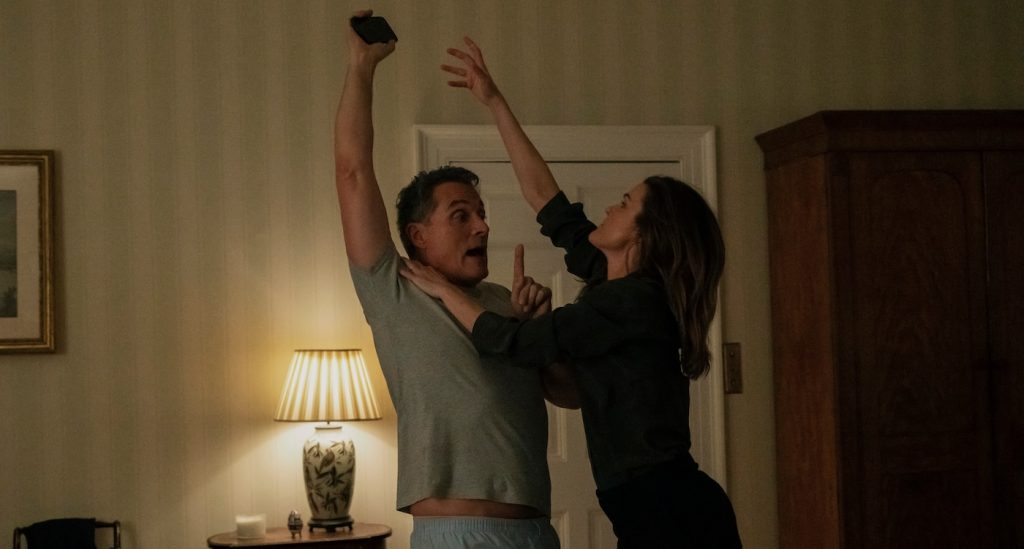
Very adult.
The writing also reminded me of movies like The Philadelphia Story and His Girl Friday. It’s that screwball thing where two people are apart but together, and it has that [snapping fingers]. It’s very difficult to get that right.
You two have chemistry, full stop.
You can see people trying for it, which I find more excruciating than Dullard’s comedy, to tell you the truth.
Because it feels forced?
The fancy talk. I find it grating when people play that style too knowingly. The sh*t that people describe as “chemistry” in reviews I find ridiculous – “finishing each other’s sentences at the same time” — basically the kind of stuff that makes executive producers high five each other in screening rooms.
Did you do a “chemistry read” with Keri to land the role?
No, it was just Deb’s gut feeling. I’d seen Keri’s stuff, I thought she was great, but we’d never met. I accepted the job. I was flown to England, where I go to work now that I live in Hollywood [laughing] — and on my first day on set, I popped into the makeup room. Keri was there, I think I made a joke, she laughed, we had a very brief chat about nothing in particular, and I came out of the trailer thinking “Oh, it’ll be fine.”
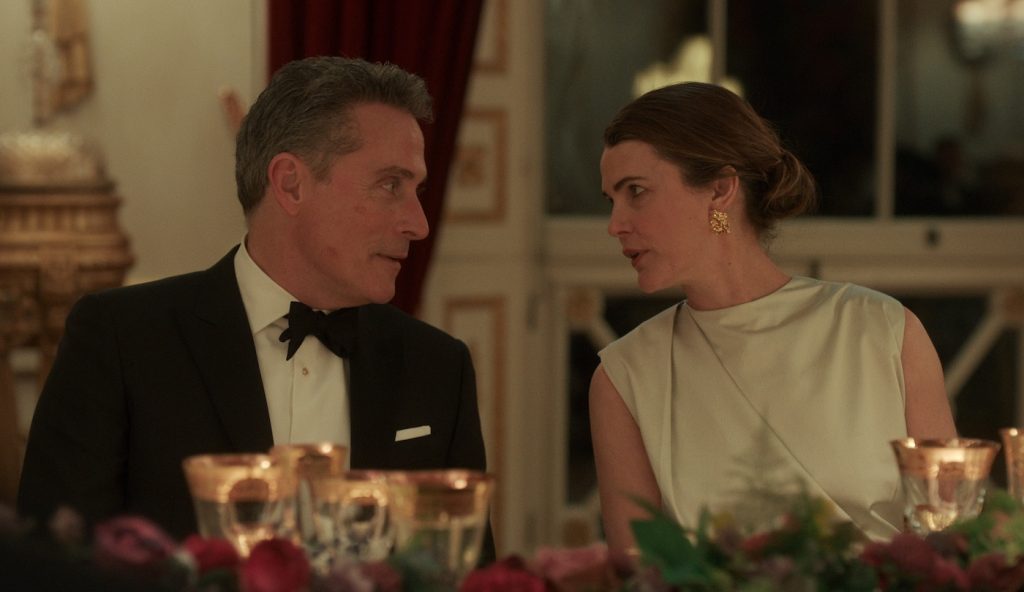
It sounds like you two did not need to plan things too much in advance.
We were just on the same page instinctively. We both have our process that we don’t make anybody else’s business, and my take on a scene will complement her take. We could have completely different conceptions of the scene, but we’re able to use our own thoughts and change and respond to each other as we’re listening. We just get each other. And I just have to say, we also have a lot of fun.
No overthinking required?
If it’s not there, then thinking about it won’t make any difference. In fact, you’re better off not trying. Because when I talk about what makes my skin crawl, it is the trying.
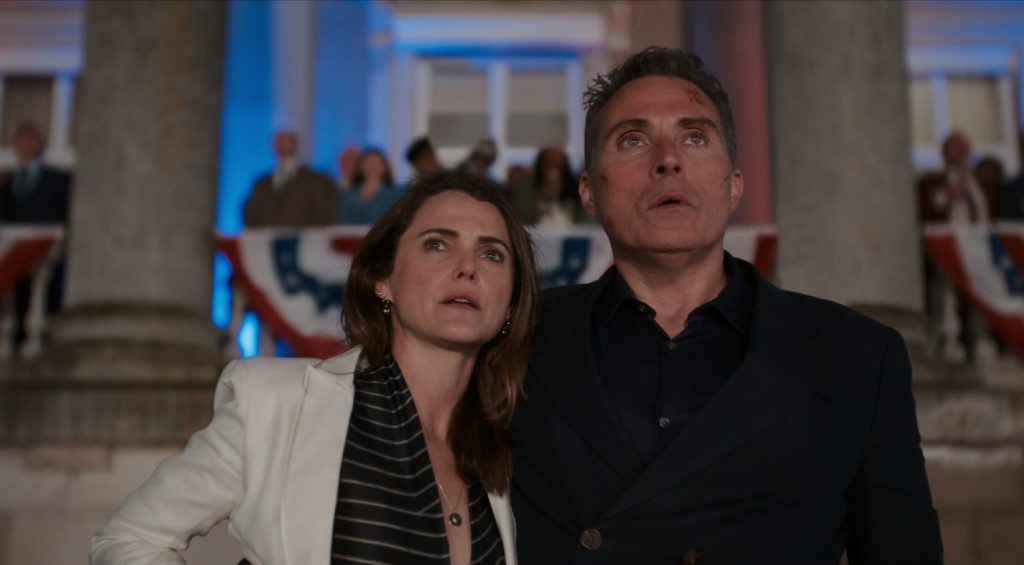
So for you…
I’m like “She’ll be fine,” and she’s like “He’ll be fine.”
The entire cast of mostly British actors in The Diplomat is unusually strong across the board. What do you make of that?
Because of the writing, because of the writing, because of the writing. Good actors will come, even for very small parts. And Team Deb is watching. If an actor comes in just for a couple of days for a few lines and they nail it and they’re not a dick and they’re fun, then there’s always the possibility that they will [be asked to] come back.
Part of what makes The Diplomat pop visually is the sense of spectacle. Do you enjoy filming in grandiose settings like St. James Cathedral and Inveraray Castle in Scotland?
As long as we don’t let the set play us. There’s an expression, “The least interesting thing about a person is the uniform.” For me, it’s about the scrappy little human fidgeting underneath, plus the exterior. And it’s the same with beautiful houses, grand doorways, and staircases. If you’re not careful, the staircase will make you walk a certain way. Sometimes it’s appropriate, but I think it’s interesting when people trip up. This show is about the reality versus the presentation.
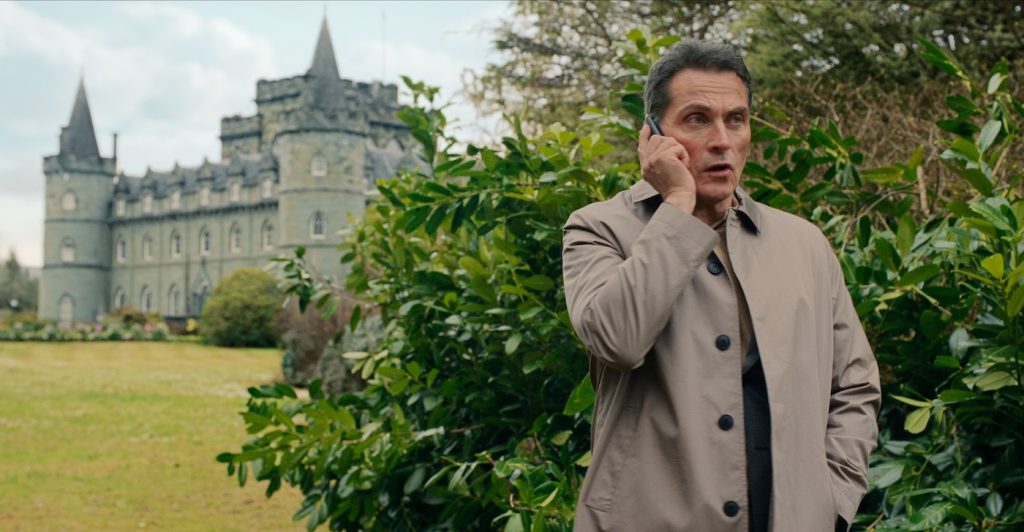
Hal’s plan to promote Kate backfires horribly at the end of Season 2. For people catching up with The Diplomat now, it’s reassuring to know that the show’s been renewed for a third Season.
It’s already in the can, and you have no idea what’s coming.
Featured image: The Diplomat. Rufus Sewell as Hal Wyler in episode 103 of The Diplomat. Cr. Alex Bailey/Netflix © 2023



